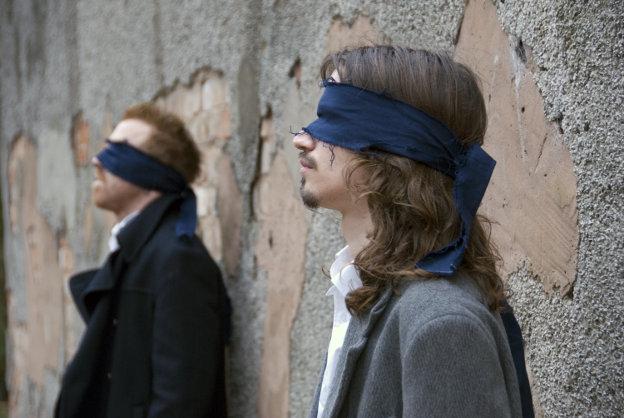The End is a palindrome performance – it loops around itself, like a bear circuiting a stage, in the process, by some writerly slight of hand, enacting the complete role reversal of its two performers. It’s structure is obsessed by parallels – nothing appears onstage without its twin – and reversals. We watch the characters of the two performers incrementally switch roles in terms of power dynamics as well as costumes, this intercut with an exploration of their own intention to find an end, to finish, and placed amidst an imaginary investigation of the theatrical realities of Shakespeare’s famous stage direction ‘exit, pursued by a bear’.
Also offering structure is the ever decreasing pile of cue cards lined up upstage, from which the performers read every line. ‘It’s an aesthetic choice’ we are told, but I wasn’t sure of what – the visual accumulations were quite pleasing but what the sense of reliance and unpreparedness intended to suggest felt unclear.
At times too, though, this show is an Ouroboros serpent. Despite protestations to the contrary, the theatre eats itself in detailed references to the exigencies of touring, the realities of devising and producing work. Perhaps the production cycle of theatre is being used here as a metaphor for some greater loop of reality and performance but it eluded me and there are only so many times you can tell the audience ‘the show sank like the biggest lead balloon ever’ without starting to invoke that perception. In a postmodern world-view there are no positive endings, nor identities, only infinite regressions, repetitions and variations: it’s an elusive concept and difficult to theatricalise beyond an idea. We did transcend this, finally, but for me this show was at its most illuminating when the calibre of the performances embodied subtle relationship and physical frailty – these were beginnings and endings that resonated emotionally as well as intellectually.
Its complexity of idea makes it rather resistant to critical summary and, if I’m honest, much of the performance also felt determined to elude any kind of concluding analysis from the audience. This made it frustrating to watch – Pinchbeck’s hectoring tone, underscored by repetitive dissonant electronica and repeated amplified shouting were harsh on the ear and spirit. So of course, the ending, all emollient synth and the tying up of the text’s loose ends (the concluding ellipsis was particularly satisfying) was a relief, albeit an ambivalent one, for any absolute conclusion was resisted to the last. No curtain call for this show then.


